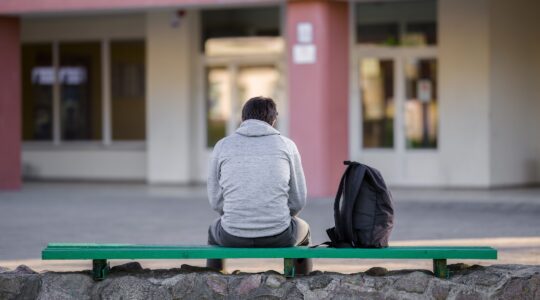As 16-year-old Elan Stochel discovered this summer, sometimes a misspelled name can make all the difference.
One of 24 teen participants in the Samberg Family History Program at the Center for Jewish History this month, Stochel, a junior at Marsha Stern Talmudical Academy, learned firsthand the joys and frustrations of genealogical research.
“You get days when you’re struggling and you got nothing and there were days when you get this wealth of information where you try a variation of a spelling,” he said. “You realize that maybe Wolf was spelled with two f’s or Solomon was Sol, and you’re excited and everyone around you gets excited and motivated.”
Stochel found several instances where the documents he located contradicted stories his relatives told, or other existing documents. Some relatives had multiple documented birth dates or hometowns.
“It’s less of a stumbling block than a point of interest,” said Stochel. “It’s where the controversy and where the contradictions lie that’s where the human aspect of history is.”
In addition to researching their own families, participants in the program also got a crash course in American Jewish history and visited key New York sites, including Ellis Island, the Lower East Side and Congregation Shearith Israel.
The program, which first ran in the summer of 2003, is funded mostly by the Samberg Family Foundation, which provides a full scholarship for every participant. The students begin their initial research during the program, but continue working on their projects until they present their findings — with pictures, documents and other artifacts — in October.
“My mission has been to try and focus the notion of doing the project onto the person themselves, the interweaving of a narrative thread,” said Ben Cutter, the senior manager for special projects at CJH. “I don’t want them just telling me that their grandfather Irving was born on this date — I want them to tell me what they did, and if they found anything that changed their perceptions.”
For Cutter, success isn’t measured by the amount of records or the size of the family tree.
“The real goal of the experience is to get them to draw this connection between looking backwards and then looking inwards,” he said.
Each participant in the program had a different experience – some finding long-lost relatives and others struggling to locate key documents.
Among the most interesting things that Stochel uncovered was the journey of his great-grandfather to this country. Arriving at a time when strict quotas were imposed, around 1920, his great-grandfather traveled to Havana, Cuba, then to the United States, in an attempt to hide his Polish origins. Despite that, he was deported upon arrival, and only later gained access to the country through Canada.
Stochel’s grandfather was intrigued to learn this, and other family members have also been eager to learn about his research.
Some participants were surprised by the emotions they felt when finding records. Others traced both Sephardic and Ashkenazic sides of their family, while others had difficulties uncovering more recent immigrant history.
“We’ve got first-generation Americans, four students whose parents are immigrants from the former Soviet Union and kids whose families have been here for generations,” said Cutter. “It’s a challenge often to look for records,” since many Soviet documents are harder to access.
Stochel hit a different obstacle when researching his grandmother who was born in Israel. “I was told by the people in the Genealogy Institute that to find that information I would probably have to go to Israel,” he said. But now that his interest is piqued, he hopes to continue his research beyond the program. And since he plans on spending a post-high school year in Israel, “it would be something great to do in my free time.”
Becca Shubert, 17, is from an interfaith family but chose to focus her research on the Jewish side of her family, her mother’s, which had emigrated from Russia. A senior at Bard High School Early College, Schubert, who lives on the Upper East Side, she realized “there is so much I didn’t know about my great-grandparents: their maiden names or where they were born.”
She discovered that two of her great-grandparents grew up less than 10 miles away from each other in Russia, and immigrated to the United States separately before finding and marrying each other.
When she showed some of her initial research to her grandmother, “she teared up,” said Shubert. “She doesn’t have a whole lot of documents.”
The New York Jewish Week brings you the stories behind the headlines, keeping you connected to Jewish life in New York. Help sustain the reporting you trust by donating today.




